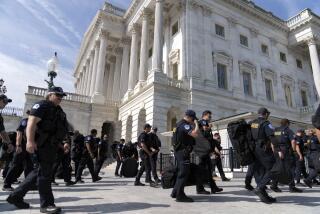Bush Won’t Address S.F. Conference on AIDS : Health: President is criticized for declining to attend the international gathering, but an aide says he will talk to a business-labor gathering on the disease.
- Share via
SAN FRANCISCO — President Bush has declined an invitation to deliver a speech at the Sixth International Conference on AIDS here June 20-24, making it the first time in three years that the host nation’s leader will not address the gathering.
Bush, who as vice president was booed and hissed at the 1987 AIDS conference in Washington when he discussed Reagan Administration plans for mandatory testing of immigrants and prisoners, also turned down a request to send a videotaped welcome, conference co-chairman Dr. John L. Ziegler said.
“We’re disappointed,” said Ziegler, professor of medicine at UC San Francisco. “We felt this was a real opportunity to for the government to make a strong statement. . . .”
Canada’s Prime Minister, Brian Mulroney, addressed last year’s session in Montreal, as did Sweden’s Prime Minister, Ingvar Carlsson, a year earlier in Stockholm.
In Washington, White House deputy press secretary Alixe Glen said the President receives hundreds of speaking invitations and must set priorities. “Each scheduling request is looked at very carefully, and I know that was the case for this one as well.”
“The President, both as a candidate and in his Administration, has addressed the AIDS issue and the need for compassion many times,” she added, citing the Bushs’ Christmas Eve visit to the National Institutes of Health to meet with adult and child AIDS patients.
In addition, Glen noted that Bush has agreed to address the National Business Leadership Conference on AIDS, a group of business and union leaders, next month in Arlington, Va.
Louis Sullivan, Health and Human Services secretary, and James O. Mason, assistant secretary for health, are considering invitations to address the conference, according to department spokesman Jim Brown.
Bush’s decision drew criticism from Stephen Morin, an aide to Rep. Nancy Pelosi (D-San Francisco) and a member of the conference’s community task force.
“I think the President has good reason for not coming,” Morin said. “Neither the people of San Francisco nor the scientific community think much of his AIDS policies.”
One particular point of contention, which threatens to mar the conference, involves the long-festering controversy over U.S. policies restricting the freedom of foreigners infected with the human immunodeficiency virus to enter the country.
Although the federal government eased the restrictions last month, infected individuals are still required to reveal their condition when they apply for a visa and seek a waiver of rules barring them from the United States.
At least 16 organizations, including the International League of Red Cross and Red Crescent Societies, have announced that they will boycott the conference, which will attract 12,000 scientists and policy makers from around the world, unless the U.S. entrance restrictions on carriers of the AIDS virus are removed.
The World Health Organization, the National Commission on AIDS and conference organizers themselves also have protested the restrictions, arguing that the curbs perpetuate the notion that HIV is casually contagious.
Morin acknowledged that Bush “has made good-faith efforts to get the message out on the need for compassion.” He added, however, that, “the first budget that Bush has had control over has been harsh and cruel.”
Although Bush’s proposed budget for fiscal 1991 earmarks $1.7 billion for AIDS prevention and research, up from $1.6 billion a year earlier, programs for AIDS treatment and care--including a $30-million drug subsidy program and a $20-million project for home and community-based care--were eliminated.
More to Read
Sign up for Essential California
The most important California stories and recommendations in your inbox every morning.
You may occasionally receive promotional content from the Los Angeles Times.










